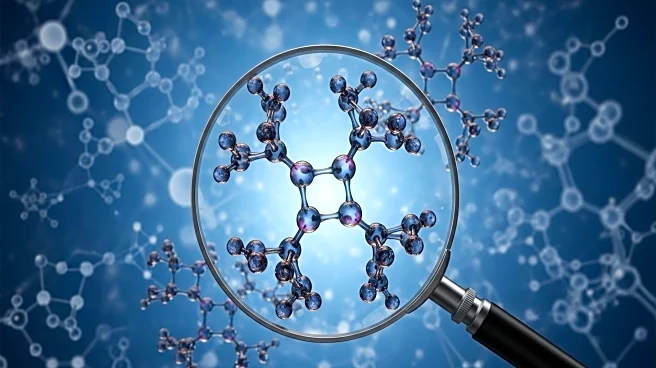What's Happening?
Researchers at Mayo Clinic have discovered a pivotal protein, KCTD10, which plays a crucial role in coordinating cellular processes during DNA replication. This protein acts as a molecular traffic controller, preventing collisions between the machinery responsible for DNA replication and RNA transcription. Such collisions can lead to DNA breaks and genomic instability, which are hallmarks of cancerous cells. The study, published in Nature, highlights KCTD10's function as a sensor that detects potential conflicts and activates an enzyme called CUL3 to remove obstructive proteins, ensuring smooth DNA replication. This discovery provides significant insights into maintaining genomic integrity and opens new avenues for cancer therapy development.
Why It's Important?
The identification of KCTD10 is significant for cancer biology, as its absence or malfunction is linked to genomic instability and tumorigenesis. Understanding how KCTD10 functions can lead to targeted cancer therapies that exploit the vulnerabilities of cancer cells deficient in this protein. Such therapies could selectively induce DNA damage in tumor cells, sparing healthy cells. This research not only advances precision oncology but also contributes to Mayo Clinic's Precure initiative, which aims to develop predictive tools for early disease management. The findings offer potential biomarkers and therapeutic targets, enhancing personalized cancer treatment strategies.
What's Next?
Future research will focus on assessing the prevalence of KCTD10 deficiency across various cancer types and screening for drugs that can target cancer cells with this weakness. The Mayo Clinic team aims to develop treatments that push vulnerable tumor cells towards programmed cell death, optimizing efficacy while minimizing side effects. This approach could lead to breakthroughs in personalized cancer therapy, offering new hope for patients with KCTD10-deficient tumors. Additionally, the study's insights into molecular traffic control at the DNA level may inspire further exploration of protein networks involved in genomic maintenance.
Beyond the Headlines
The discovery of KCTD10's role in genomic stability underscores the complexity of intracellular coordination essential for life. It highlights the importance of tightly regulated protein networks in maintaining genome integrity. The research suggests that the co-directional orientation of replication and transcription machinery may be an evolutionary strategy to minimize DNA damage. This deeper understanding of cellular processes could influence future studies on genome architecture and its implications for disease prevention and treatment.










